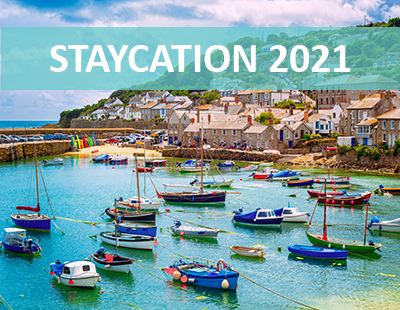YouGov has also found that seven in 10 Brits would be willing to sacrifice foreign holidays this year if it meant the country could still open up domestically as planned.
With this in mind, investing in a holiday let is likely to become much more appealing as many people look to explore the UK this spring, summer and autumn for holidays, weekends away and city breaks.
Since Monday (April 12), people in England have been able to go on a self-catering holiday in a cottage, caravan or campsite which does not involve shared indoor facilities - but only with members of their household or bubble. The rules are different in other parts of the UK - in Scotland, for example, people must not travel between north of the border and the rest of the UK without a reasonable excuse, while travel around mainland Scotland is prohibited until April 26.
Following Prime Minister Boris Johnson’s announcement of the roadmap on February 22, Awaze - whose brands include cottages.com and Hoseasons – says it has sold more than 10,000 UK breaks at a record rate of up to one per second, showing how much pent-up demand there is.
In this series, Property Investor Today will be exploring how to run a successful holiday let, the UK’s main holiday let hotspots and the pros and cons of holiday lets.
A booming marketplace
The domestic holiday let market has been one of the winners over the last year (during the times when we’ve been allowed to travel), according to Jessica Gillingham, founder and director of Abode PR.
Many leisure destinations within the UK were positively booming during summer 2020 as we came out of the first national lockdown. Something similar is expected this year, especially as the weather improves.
There will be a desire not to see the sort of scenes witnessed on Bournemouth beach or various beauty hotspots last summer, but with people potentially seeking out quieter, more remote locations, to avoid the crowds, the demand for good-quality holiday lets is likely to soar.
“[Last year] holiday rentals companies such as Beach Retreats and Sykes Holiday Cottages saw some record months for bookings,” Gillingham explains.
“As domestic travel resumes, and travel abroad remains complicated, we will see more and more demand from travellers to enjoy the treasures we have here in the UK. This increase in demand will generate a need for more and more quality inventory of properties to enter the lucrative holiday let market across traditional holiday locations but also many less well-known beach resorts, countryside locations and smaller market towns.”
She adds: “For owners, there are a plethora of tools that can help manage rentals, from smart locks to booking management. Alternatively, owners can opt to work with an experienced property manager to lessen the workload but still reap the rewards.”
Cleaning, tech, operations, property care and safety
Jeremy Gall, founder and chief executive of Breezeway, a US-based property operations and services platform, says short-term rentals have proven their resiliency over the past year and continue to appeal as a travel category, attracting new guests and carving out a greater market share.
“Whilst demand for holiday lets remains high, it’s important for owners to note that customer expectations have changed,” he says.
“Elevated expectations of how a property is presented, maintained and operated are here to stay. From arrival to departure, the smooth running of housekeeping processes, safety checks and communication channels with guests are crucial to the overall customer experience.”
He adds: “Our recent survey found that over 71% of short-term rental operators felt that guests’ increased sensitivity towards cleanliness and safety in 2021 will remain indefinitely.”
As a result, he continues, owners are ‘leveraging tech solutions’ to automate back-end functions like task assignments, work coordination, quality assurance, and asset management, ‘in order to meet these increased demands’.
“Some 94% of operators plan on addressing property and guest safety in 2021 - it’s all about professionalism,” Gall insists. “Short-term rentals are in a strong position to attract travellers, particularly from the domestic market, and owners who automate their operational processes will continue to thrive.”
Smart home tech and property automation
Sean Miller, president of Point Central, a company providing smart home solutions to holiday rental managers, argues that smart home tech was previously considered a ‘nice-to-have’ but we are now seeing an increase in the rate of tech adoption in both our homes and the properties that we rent for holidays.
“If applied correctly, smart tech can act as a guest experience differentiator,” he says. “Today’s guest is digitally connected and now demands a higher level of digital functionality throughout their booking journey and stay. This could include direct-to-home check in, keyless entry so there are no lost or floating keys, or connected thermostats controlled to allow optimal temperature on arrival.”
He adds: “These features are expected by the more than 100 million connected European households expected by 2024 - what’s more, they’re willing to pay for it.”
‘Teching up’ your holiday let will not only delight your guests, according to Miller, but will also make the property more efficient. Savings of up to 23% on heating and cooling are achievable with the right systems in place, while tech can monitor and protect your assets from HVAC overuse, water damage and during the off-season when it might be vacant.
“Owners now have the opportunity to improve the guest experience as well as make their property investment more economically efficient, safe and protected. What’s great about the menu of smart tech on offer is that it’s accessible to all, from large property management companies to the owner of a single holiday let. Tech is a great leveller in that respect, and it can go a long way to achieving rental success.”
Keyless entry and a contactless experience
Steve Davis, chief executive of holiday rental automation technology company Operto, says one of the biggest learnings from 2020 for holiday let owners was that guests want a contactless experience when they choose to stay in their properties.
“Customers have been selecting self-contained, socially distanced short-term rentals for staycations over hotels and this is likely to continue for some time,” Davis says. “But what does a contactless stay actually mean? It’s a hands-free process for the guest, from beginning to end, and that all starts with a keyless entry to their chosen property.”
Gone, says Davis, are the days of leaving a set of keys under a plant pot or missed meetups with owners to be ‘let in’.
“Guests want to know that when they arrive, after a long drive with the family, that they can gain quick, easy access to their rental. They want a connected experience which doesn’t involve searching high and low in the dark for a set of keys.”
Davis says that installing a keyless entry system in your property also gives peace of mind in terms of security, as you can track exactly who is coming in and out of the property for cleaning or maintenance.
“Coupled with the benefits of being able to manage your rental at a distance and no need for additional staff to help on arrival, keyless entry is a way in which you can streamline your operations and become more efficient,” he concludes.
Tailored insurance and guest screening
Andrew Bate, founder and chief executive of Safely.com, says travellers have been forced to explore and reconnect with their own staycation destinations, in light of facing endless restrictions.
“Many have found they actually enjoy the convenience of being able to get in the car and drive to a holiday let - without the stress and cost of an airport visit. This is all positive - demand for domestic holiday lets is high. But before investors and owners take the leap and capitalise on this demand, they need to make sure they have the basics in place.”
Bate adds: “When you rent out your second home - perhaps somewhere you’ve bought to spend time as a family, a place in which to create long-lasting memories - you are essentially opening the door to an internet stranger. Even though only 3% of reservations made ever actually result in an insurance claim, specifically tailored short-term rental insurance is an essential tool in your asset protection armour.”
He says that many owners mistakenly think that an Airbnb Host Guarantee, for example, offers all the protection needed if they are faced with a claim. Experience shows that the cover and customer service provided by guarantees such as this can often be lacking and frustrating, he claims.
“Guest screening solutions are another way of ensuring that the internet strangers owners are inviting into their holiday homes are going to be ‘good guests’ - giving peace of mind. Insurance solutions like these can set the groundwork for a sustainable holiday rental business or even just enable owners to feel reassured and comfortable about handing over the keys to their property.”
Holiday let tax relief and flexible living
Mike Liverton, the founder and chief executive of Jetstream and Leavetown, says property investors are eyeing up the lucrative holiday let market as a way of pivoting from other less profitable sectors.
“Some are considering swapping buy-to-lets for holiday lets, capitalising on surging demand from pent-up holidaymakers,” he explains.
“Two distinct benefits of short-term rentals, as opposed to longer lets, are the higher income potential (due to flexible pricing) and holiday let tax relief. A further advantage is the emerging trend of guests staying in holiday properties for longer periods of time as they combine leisure time with working remotely.”
He adds: “This flexible living, a blurring of work/play, further strengthens the sector as a safe bet for investment as people realise there is no longer a firm divide between home and office.”
In order to make the most of this growing sector, owners with little prior experience would do well to invest in turn-key solutions, he says, which can get them up and running as a profitable business as quickly as possible.
“One of the key factors in this is deciding how to market and list your rental. Reaching your potential audience, be they family staycationers looking for summer holiday homes or remote workers taking a break alongside Zoom meetings, is one of the biggest factors in determining your success.”
Across the next few weeks, PIT will be carrying out a series of articles focusing on the expected staycation boom in 2021. Keep your eye out for the Staycation 2021 logo on stories to find out everything from the best staycation hotspots to the pros and cons of this type of investment.









.png)










Join the conversation
Be the first to comment (please use the comment box below)
Please login to comment